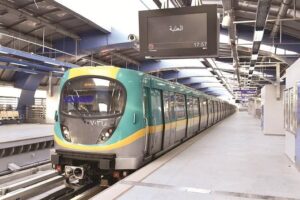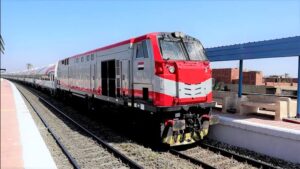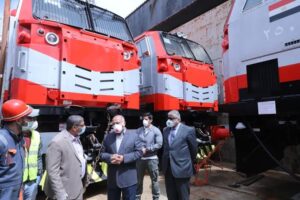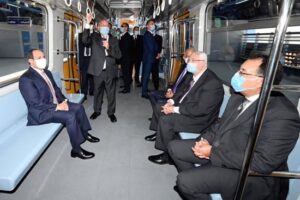For overground and underground rail transport, immense achievements have been made in the last seven years since President Abdel Fattah El Sisi assumed office.
Radical overhaul in railways
Efficiency and safety are two areas in which Egyptian National Railways (ENR) have heavily invested. Everything from signalling systems, track and operational practices have been modernised so that the railways can meet social and economic demands.
The signal system on the Arab el-Raml-Alexandria and Cairo-Banha lines have been computerised.
The Cairo-Aswan and the Benha-Port Said tracks have been re-laid. Besides the (literal) realities on the ground, management and operational practices have been radically overhauled.

Freight rolling stock
American Progress Rail Company was contracted to supply 50 new locomotives, modernise 50 Henschel locomotives overhaul for 41 other traction units.
Progress Rail concluded a 15-year maintenance contract for 141 locomotives at a cost of $466 million. Motors for 134 locomotives were shipped back to their makers for overhaul, and 102 motors are now back in Egypt. Thanks to finance from the European Bank for Reconstruction and Development (EBRD), 100 locomotives worth a total €290 million will be supplied.
SEMAF is to make and supply a complete range of freight rolling stock: 140 container ‘skellies’, 75 grain wagons and 1000 other items such as hopper trucks, box cars and brake vans.
Passenger accommodation
Negotiations are ongoing with SEMAF for 200 sleeping cars, of which 40 per cent of components and assembly work will be local.
The Russian Transmash Holding Company agreed to supply 1,300 saloon cars at a cost of €1.016 billion.
Of these vehicles, 300 will be for first and second class with air-conditioning and 500 third-class coaches will be air-conditioned. To date, 385 new coaches have been completed.
Spain’s TALGO Company delivered six diesel traction multiple units with air-conditioning in conjunction with a seven-year maintenance contract costing €157 million euros.
ENR’s Abu Radi workshops have refurbished 90 Spanish air-conditioned coaches along with 228 regular ENR coaches.

Infrastructure
More than 500 kilometres of track has been re-laid. The Austrian firm Plasser & Theurer Company has supplied four track diagnostic ultrasonic machines.
Foreign experts are training ENR employees on its operation and use. This machine inspects the condition of track.
Three Egyptian private sector newcomers to the railway sector have been signed up by ENR, in addition to its affiliates EGYFRI and ERTRACK.
More than 170 stations have been given a facelift and the platforms at 80 stations have been rebuilt to improve passenger safety.
Permanent way
To ensure that neither livestock nor people wander onto the lines, 185 kilometres of fencing is to be put up in tandem with the maintenance of 275 kilometres of existing fences.
As for level crossings, 751 have been reconstructed and 505 now have proper control systems. Moreover, the development of control systems for 505 level crossings has been completed. Another 351 crossings and control systems for 615 others are in progress.
Signalling
To date, work by the Spanish Thales Company, ALCAN, CONSERV and TEC is 78 per cent complete on the Cairo-Alexandria line.
Likewise, signals updates are underway on the Banha-Zagazig-Ismailia-Port Said and the Cairo-High Dam lines
The Italian Alstom Company and Hassan Allam & Sons Company are three-quarters of the way through signals modernisation on the Beni Suef-Assiout line.
Meanwhile, Work by Thales, Samcrete and National Grid is half completed on the Assiout-Sohag-Nagaa Hammadi line.

Workshop development
The first phase of developing the main workshops and 20 sub-workshops has been completed. Phase two is currently underway. The Ministry of Transport has plans to make the workshops into companies, which would either be state-owned or is managed with the private sector.
New contracts to this effect will include an agreement to deliver maintenance and spare parts for 15 years.
Upgrading Underground
The Metro Authority has undertaken 26 projects during the past seven years since President Abdel Fattah El Sisi came to power.
Orascom and the Arab Contractors Company completed the seven-kilometre extension of Line 3 in the eastern part of the capital in 2020.
This extension is expected to carry 1.5 million passengers a day – a boon for commuters.
Line 4, which terminated at Haroun, Heliopolis, added ten stations to Adly Mansour on 11.5 kilometres of track at a cost of €814 million and LE12.1 billion.
Line 2 (Shubra el-Kheima-el-Monib) now operates four new air-conditioned trains costing LE464 million.
On lines 1 and 2, 850 new ticket barriers were installed for LE406.3 billion. El-Marg, line 1’s northern terminus, underwent a LE43 million facelift.
Improvements to the metro service include cleaner stations and trains, removal of illegal electrical connections, stricter adherence to train schedules, and more trains on official holidays.
The 1.36 kilometre track between el-Marg and el-Marg el-Gadida was doubled at a cost of LE444.2 million. Monitoring systems, 46 escalators and 28 elevators have been installed costing LE105 million.

NAC, October City monorails
The New Administrative Capital (NAC) monorail will have a 56.5 kilometre monorail connection serving 22 stations.
The construction of another monorail to 6 October City is in progress. When the 42-kilometre section is complete it will serve 12 stations. Two 30-year maintenance contracts for the monorails have been signed.
ENR also started a new 70-kilometre electric train route, Al-Salam-10 Ramadan-NAC, which will cost $1200 million and LE7 billion.






Discussion about this post